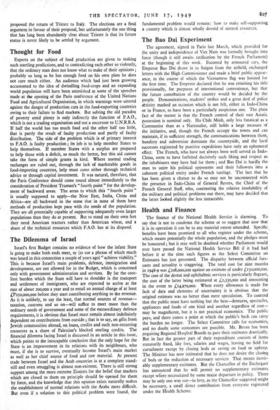The Bao Da( Experiment
The agreement, signed in Paris last March, which provided for the unity and independence of Viet Nam was formally brought into force (though it still awaits ratification by the French Parliament) at the beginning of this week. Escorted by armoured cars, the Emperor Bao Dai drove in to Saigon from the airfield, exchanged letters with the High Commissioner and made a brief public appear- ance, in the course of which the Vietnamese flag was hoisted for the first time. The Emperor declared that he was retaining his title provisionally, for purposes of international convenience, but that the future constitution of the country would be decided by the people. Demonstrations, students' strikes and a great deal of police activity marked an occasion which is not felt, either in Indo-China or in France, to have been a particularly auspicious one. The plain fact of the matter is that the French control of their vast Asiatic possession is nominal only. Ho'Chih Minh, only less fanatical as a Communist than as a Nationalist, still holds a large measure of the initiative, and, though the French occupy the towns and can maintain, if in sufficient strength, the communications between them, banditry and subversion dominate the countryside, and the local successes registered by punitive expeditions have only an ephemeral effect. The French, who have not always been well served in Indo- China, seem to have forfeited decisively such liking and respect as the inhabitants may have had for them ; and Bao Dai is hardly the man to unite his political opponents and their followers into a coherent political entity under French tutelage. The fact that he has been given a chance to do so may not be unconnected with the presence in Indo-China of General Revers, the Chief of the French General Staff, who, contrasting the relative insolubility, of the military and political problems out there, may have decided that the latter looked slightly the less intractable.






































 Previous page
Previous page